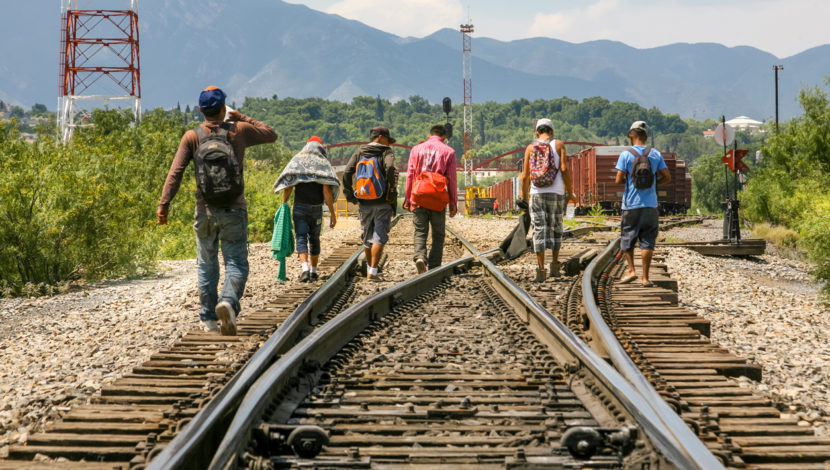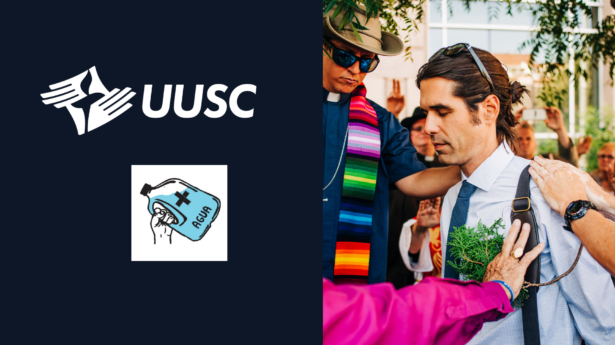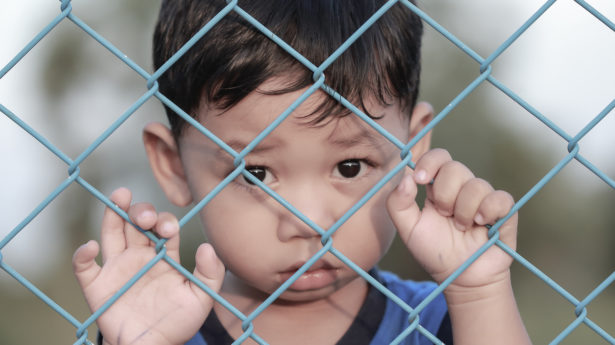The Unitarian Universalist Service Committee advances human rights through grassroots collaborations.
Invisible Walls Across the Continent: Preserving The Right to Asylum (Part 1)

By on October 2, 2019
In the early days of September, representatives of civil society in Central America and Mexico, including some of UUSC’s partners, converged on Washington, D.C. for a shared delegation. Over the course of three days, leaders from multiple human rights groups and community-led organizations, as well as UUSC staff, met with members of the U.S. Congress to describe the unjust realities facing migrants and asylum-seekers in the region, many of which are the direct consequence of U.S. policies.
In the weeks since the delegation, the Trump administration has only taken further steps to dismantle U.S. institutions designed to uphold the internationally-protected rights of displaced persons. With astonishing rapidity and indifference to the suffering that will result, the U.S. government is throwing up new barriers to asylum across the continent—creating what our partners described as “invisible walls,” more deadly than any physical barrier. The following is only a partial list of the administration’s most recent assaults on people seeking protection.
“Safe Third Country” Agreements that Are the Opposite of Safe
The Trump administration is continuing its push to sign accords with Guatemala, Honduras, and El Salvador that would designate these countries as “safe” places to deport migrants, without ever receiving an asylum hearing in the United States. These so-called “safe third country” agreements (which the administration also calls “asylum cooperation agreements”) are in violation of U.S. asylum law and international treaties, which are designed to prevent governments from deporting people to danger.
None of the northern Central American countries is equipped to provide refuge for people fleeing for their lives—still less to replace the entire U.S. asylum system. The government of El Salvador, which reached a deportation agreement with the United States on September 20, reportedly employs only a single officer to review all asylum cases in the country. Honduras, which has reportedly also accepted a “safe third country” agreement with the Trump administration, is plagued by violence and political corruption, much of it the result of a U.S.-backed coup d’état in 2009.
In the case of Guatemala as well, the country is certainly not a safe place for refugees—or even for its own citizens. Outgoing Guatemalan President Jimmy Morales recently declared a “state of siege” in large parts of the country, suspending civil liberties in places inhabited by Indigenous people and human rights defenders who are already at risk.
Banning Asylum
As dangerous as these safe-third country agreements are, however, the Trump administration has also asserted the power to deport people to third countries, even without such agreements in place. Under the administration’s so-called “third country asylum rule,” unveiled in July, the government would ban from asylum anyone who passed through another country on their way to the U.S. border, and who cannot prove they were rejected for asylum in the previous country. In practice, such a rule would all but end the right to seek asylum in the United States.
Such a rule is impossible to square with U.S. asylum law. For this reason, a U.S. federal court rightly put this latest asylum ban on hold across the country—twice—until courts could reach a decision on its underlying legality. Nevertheless, in a bizarre unsigned order—from which two justices dissented—the U.S. Supreme Court decided on September 11 to lift the lower court’s injunction, allowing the rule to go into effect.
Forcing Asylum-Seekers to Remain in Mexico
The U.S. agencies enforcing immigration law have revealed little as to how they will implement the asylum ban and “safe third country” agreements. In the meantime, however, another Trump administration program is expanding. The so-called “Migration Protection Protocols,” better known as “Remain in Mexico,” permit the U.S. government to force asylum-seekers to wait south of the border, where their lives are often at risk. In a recent statement to the press, Department of Homeland Security officials implied that they intend to subject more asylum-seekers to this program in the coming weeks and months.
Meanwhile, the U.S. government continues the unlawful practice of “metering” asylum-seekers at the border, placing people on waitlists that take no account of the urgency of their need for protection—and often leave them at the mercy of extortionists. These policies, combined with Mexico’s recent moves—in the face of U.S. pressure—to restrict the movement of asylum-seekers within their territory, have already left thousands of people stranded, without hope or protection.
Dismantling the U.S. Refugee Program
Not content with breaking down the asylum system, the Trump administration has also taken aim at the separate—but related—U.S. Refugee Program. This is the program through which the U.S. government resettles people from third countries who have been forced to flee their homes. (Asylum, by contrast, is when people enter U.S. territory and request protection on-site).
Trump ran as a candidate stoking anti-refugee fear-mongering, and he has followed this up by slashing the refugee program in half in each of the last two fiscal years. As a result, organizations that resettle refugees have been forced to shutter offices, and families who spent years hoping for a chance to start a new and safer life in the United States are being turned away. Now, in a further harmful measure, the administration has also announced an order to allow states and municipalities to refuse to welcome refugees, even after they have been admitted to the United States lawfully for resettlement.
The human costs of these policies are staggering. The U.S. asylum and refugee programs were created for a reason–they literally save lives. In the absence of meaningful asylum protections, people die. The administration’s move to willfully dismantle asylum and refugee protections shows a reckless indifference to human life—one that is ultimately grounded in the poisonous ideology of white supremacy. At UUSC, we hold the conviction that the future does not belong to builders of walls and division, but to the shared aspirations of humankind to live in a more just world.
Photo Credit: iStock – Photo Beto
***
About UUSC: Guided by the belief that all people have inherent worth and dignity, UUSC advances human rights globally by partnering with affected communities who are confronting injustice, mobilizing to challenge oppressive systems, and inspiring and sustaining spiritually grounded activism for justice. We invite you to join us in this journey toward realizing a better future!

